北师大版高中英语模块4 Unit 11 The media 被动语态复习2
文档属性
| 名称 | 北师大版高中英语模块4 Unit 11 The media 被动语态复习2 |
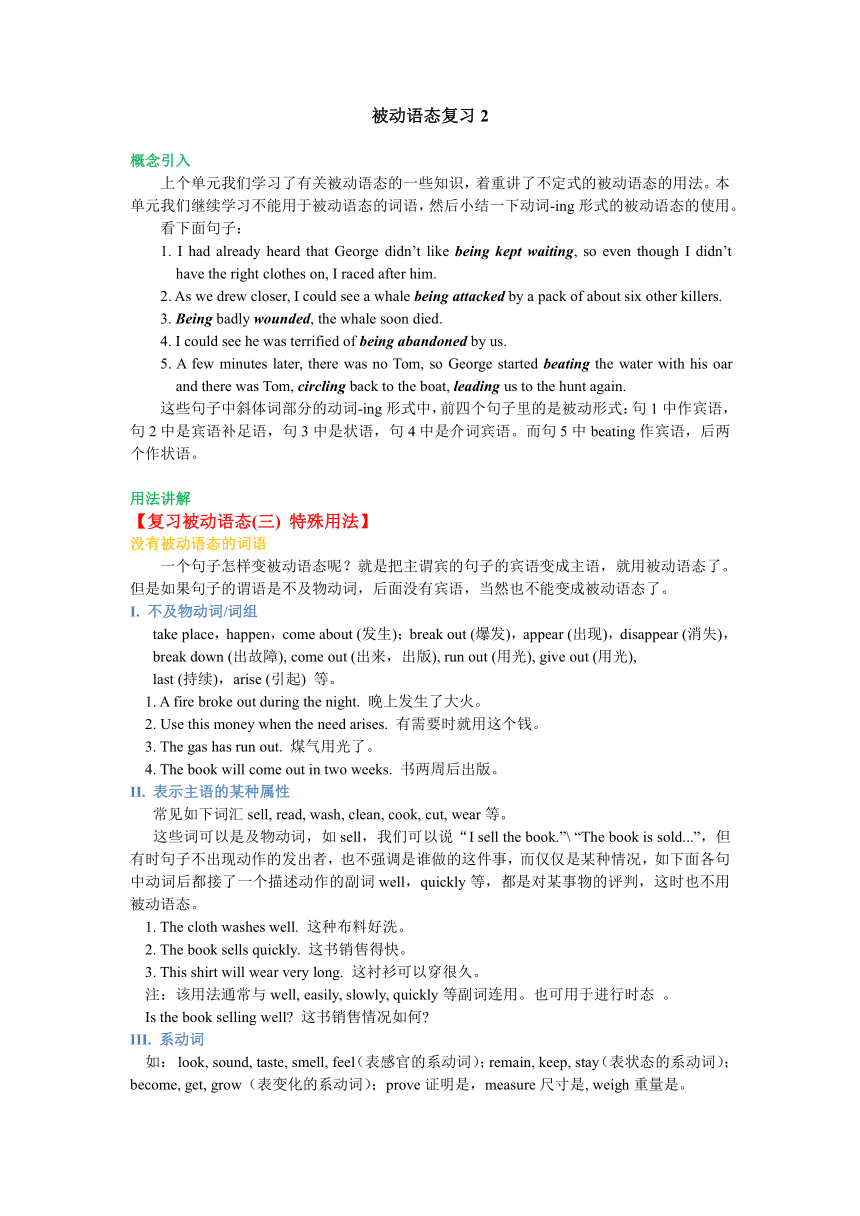
|
|
| 格式 | zip | ||
| 文件大小 | 39.7KB | ||
| 资源类型 | 教案 | ||
| 版本资源 | 北师大版 | ||
| 科目 | 英语 | ||
| 更新时间 | 2019-11-10 20:38:19 | ||
图片预览

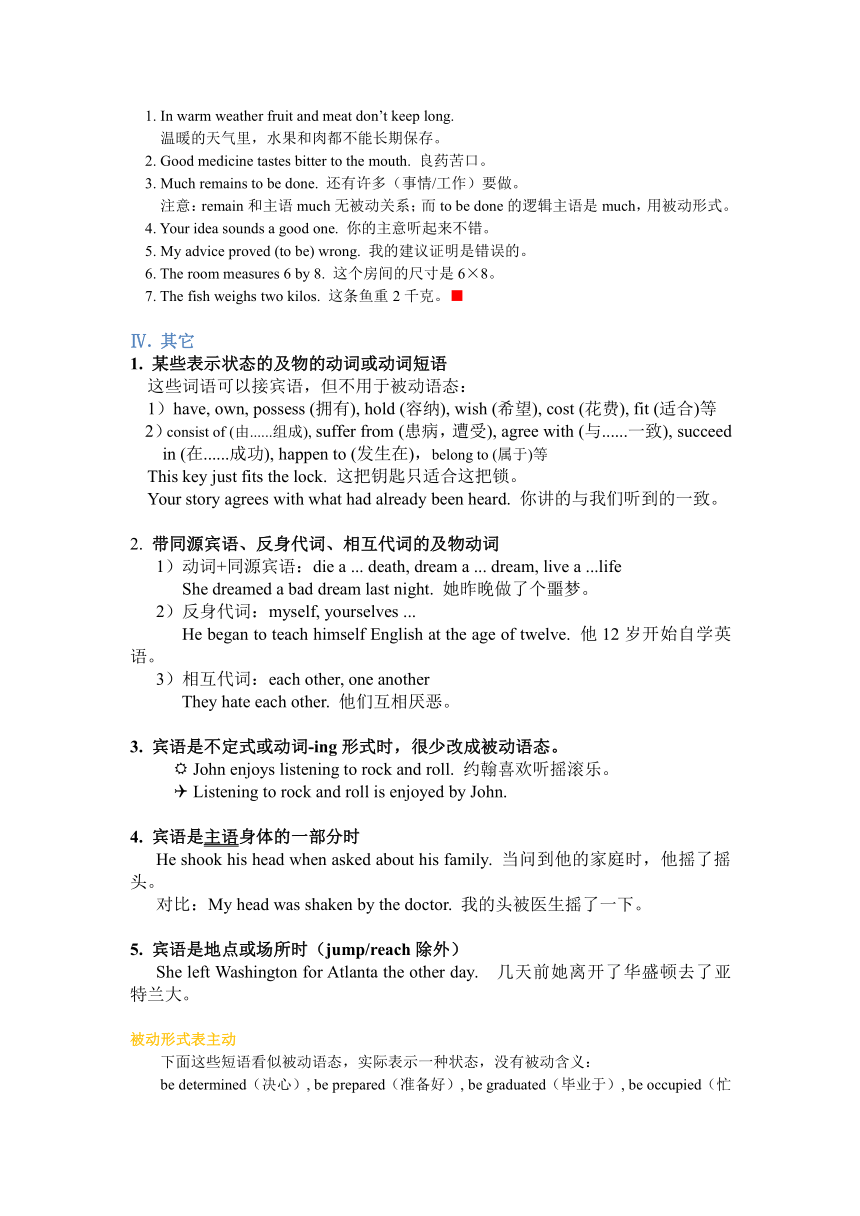
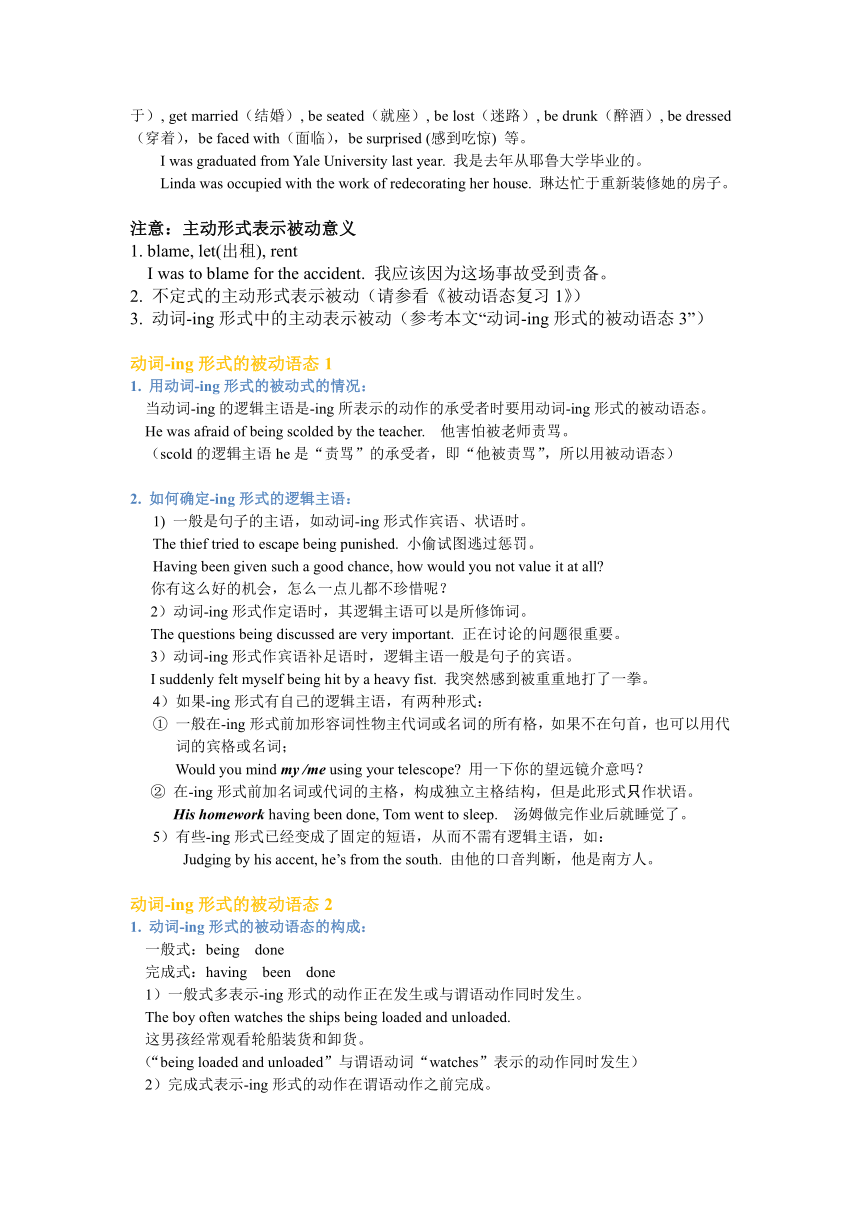
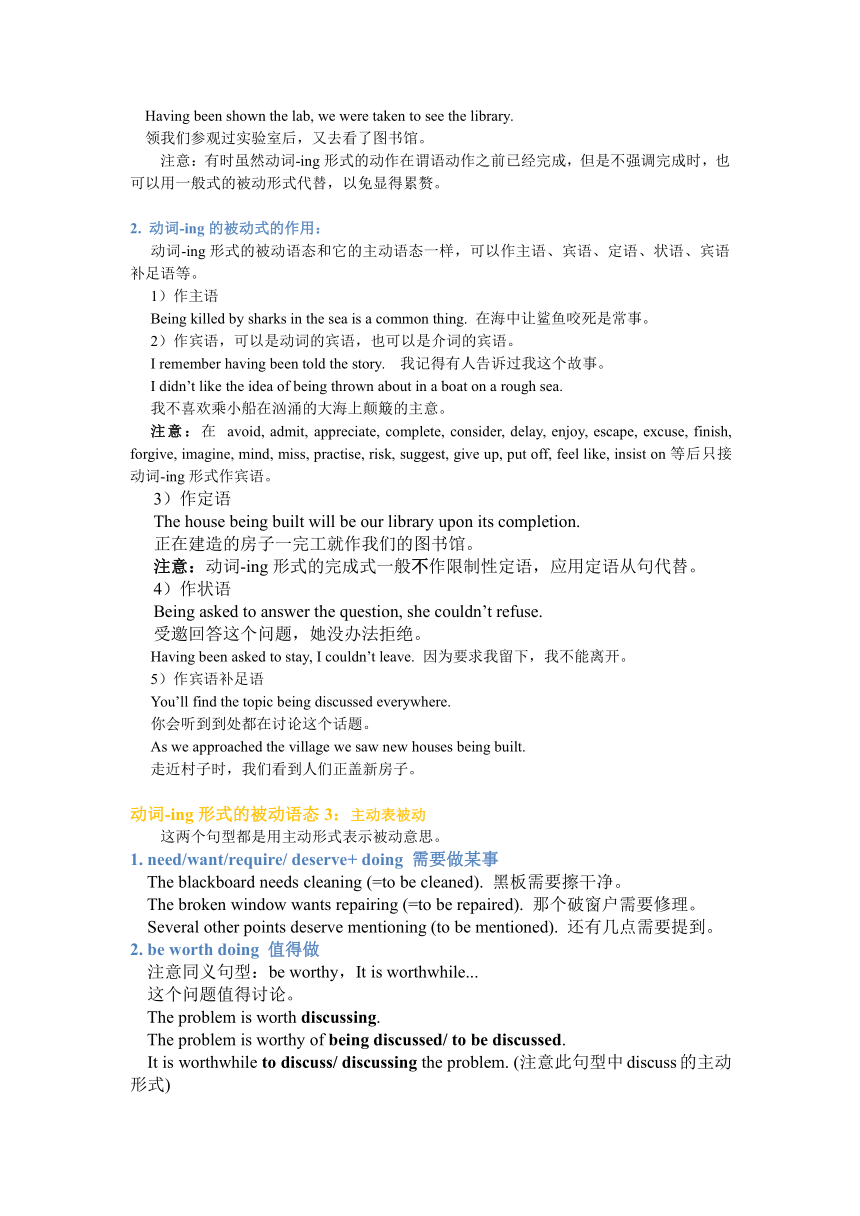
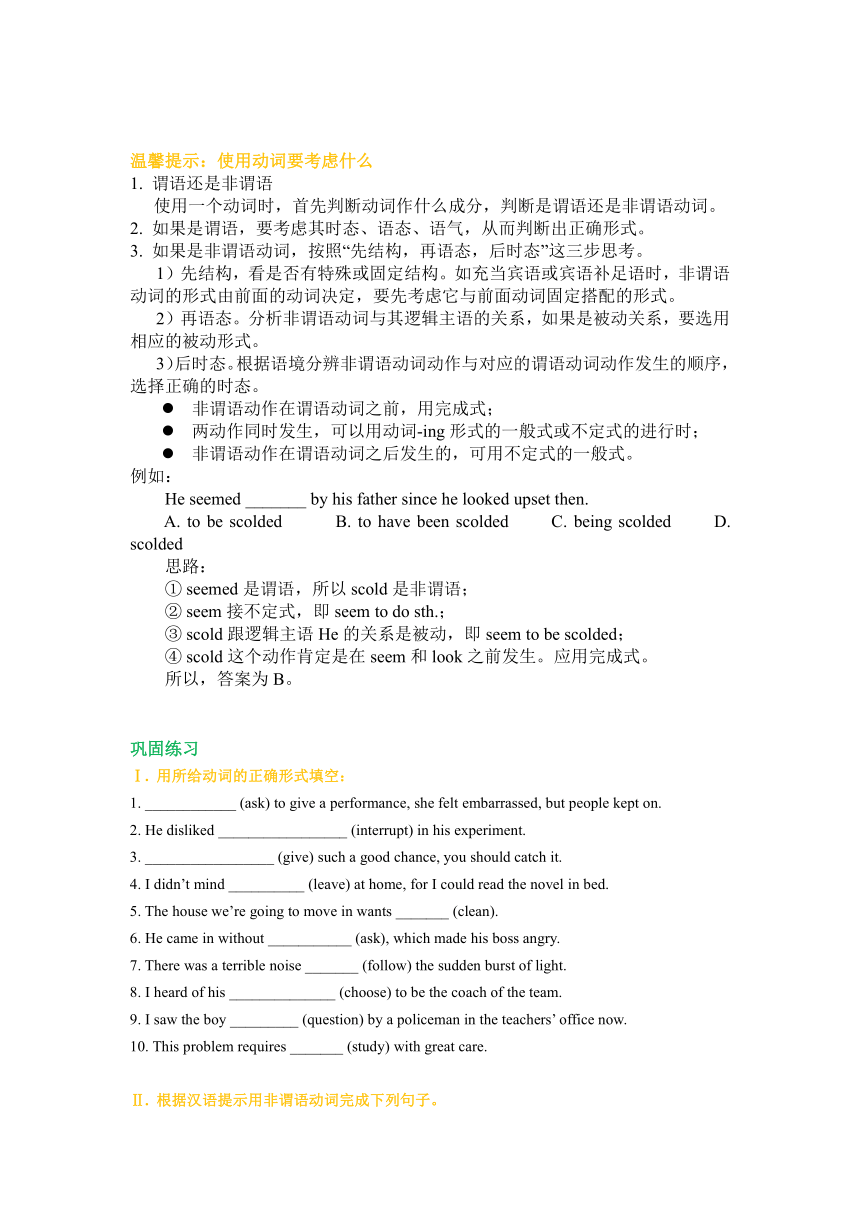
文档简介
被动语态复习2
概念引入
上个单元我们学习了有关被动语态的一些知识,着重讲了不定式的被动语态的用法。本单元我们继续学习不能用于被动语态的词语,然后小结一下动词-ing形式的被动语态的使用。
看下面句子:
1. I had already heard that George didn’t like being kept waiting, so even though I didn’t have the right clothes on, I raced after him.
2. As we drew closer, I could see a whale being attacked by a pack of about six other killers.
3. Being badly wounded, the whale soon died.
4. I could see he was terrified of being abandoned by us.
5. A few minutes later, there was no Tom, so George started beating the water with his oar and there was Tom, circling back to the boat, leading us to the hunt again.
这些句子中斜体词部分的动词-ing形式中,前四个句子里的是被动形式:句1中作宾语,句2中是宾语补足语,句3中是状语,句4中是介词宾语。而句5中beating作宾语,后两个作状语。
用法讲解
【复习被动语态(三) 特殊用法】
没有被动语态的词语
一个句子怎样变被动语态呢?就是把主谓宾的句子的宾语变成主语,就用被动语态了。但是如果句子的谓语是不及物动词,后面没有宾语,当然也不能变成被动语态了。
I. 不及物动词/词组
take place,happen,come about (发生);break out (爆发),appear (出现),disappear (消失),
break down (出故障), come out (出来,出版), run out (用光), give out (用光),
last (持续),arise (引起) 等。
1. A fire broke out during the night. 晚上发生了大火。
2. Use this money when the need arises. 有需要时就用这个钱。
3. The gas has run out. 煤气用光了。
4. The book will come out in two weeks. 书两周后出版。
II. 表示主语的某种属性
常见如下词汇sell, read, wash, clean, cook, cut, wear等。
这些词可以是及物动词,如sell,我们可以说“I sell the book.” “The book is sold...”,但有时句子不出现动作的发出者,也不强调是谁做的这件事,而仅仅是某种情况,如下面各句中动词后都接了一个描述动作的副词well,quickly等,都是对某事物的评判,这时也不用被动语态。
1. The cloth washes well. 这种布料好洗。
2. The book sells quickly. 这书销售得快。
3. This shirt will wear very long. 这衬衫可以穿很久。
注:该用法通常与well, easily, slowly, quickly等副词连用。也可用于进行时态 。
Is the book selling well? 这书销售情况如何?
III. 系动词
如: look, sound, taste, smell, feel(表感官的系动词);remain, keep, stay(表状态的系动词);become, get, grow(表变化的系动词);prove证明是,measure尺寸是, weigh重量是。
1. In warm weather fruit and meat don’t keep long.
温暖的天气里,水果和肉都不能长期保存。
2. Good medicine tastes bitter to the mouth. 良药苦口。
3. Much remains to be done. 还有许多(事情/工作)要做。
注意:remain和主语much无被动关系;而to be done的逻辑主语是much,用被动形式。
4. Your idea sounds a good one. 你的主意听起来不错。
5. My advice proved (to be) wrong. 我的建议证明是错误的。
6. The room measures 6 by 8. 这个房间的尺寸是6×8。
7. The fish weighs two kilos. 这条鱼重2千克。■
Ⅳ. 其它
1. 某些表示状态的及物的动词或动词短语
这些词语可以接宾语,但不用于被动语态:
1)have, own, possess (拥有), hold (容纳), wish (希望), cost (花费), fit (适合)等
2)consist of (由......组成), suffer from (患病,遭受), agree with (与......一致), succeed in (在......成功), happen to (发生在),belong to (属于)等
This key just fits the lock. 这把钥匙只适合这把锁。
Your story agrees with what had already been heard. 你讲的与我们听到的一致。
2. 带同源宾语、反身代词、相互代词的及物动词
1)动词+同源宾语:die a ... death, dream a ... dream, live a ...life
She dreamed a bad dream last night. 她昨晚做了个噩梦。
2)反身代词:myself, yourselves ...
He began to teach himself English at the age of twelve. 他12岁开始自学英语。
3)相互代词:each other, one another
They hate each other. 他们互相厌恶。
3. 宾语是不定式或动词-ing形式时,很少改成被动语态。
( John enjoys listening to rock and roll. 约翰喜欢听摇滚乐。
( Listening to rock and roll is enjoyed by John.
4. 宾语是主语身体的一部分时
He shook his head when asked about his family. 当问到他的家庭时,他摇了摇头。
对比:My head was shaken by the doctor. 我的头被医生摇了一下。
5. 宾语是地点或场所时(jump/reach除外)
She left Washington for Atlanta the other day. 几天前她离开了华盛顿去了亚特兰大。
被动形式表主动
下面这些短语看似被动语态,实际表示一种状态,没有被动含义:
be determined(决心), be prepared(准备好), be graduated(毕业于), be occupied(忙于), get married(结婚), be seated(就座), be lost(迷路), be drunk(醉酒), be dressed(穿着),be faced with(面临),be surprised (感到吃惊) 等。
I was graduated from Yale University last year. 我是去年从耶鲁大学毕业的。
Linda was occupied with the work of redecorating her house. 琳达忙于重新装修她的房子。
注意:主动形式表示被动意义
1. blame, let(出租), rent
I was to blame for the accident. 我应该因为这场事故受到责备。
2. 不定式的主动形式表示被动(请参看《被动语态复习1》)
3. 动词-ing形式中的主动表示被动(参考本文“动词-ing形式的被动语态3”)
动词-ing形式的被动语态1
1. 用动词-ing形式的被动式的情况:
当动词-ing的逻辑主语是-ing所表示的动作的承受者时要用动词-ing形式的被动语态。
He was afraid of being scolded by the teacher. 他害怕被老师责骂。
(scold的逻辑主语he是“责骂”的承受者,即“他被责骂”,所以用被动语态)
2. 如何确定-ing形式的逻辑主语:????
1) 一般是句子的主语,如动词-ing形式作宾语、状语时。
The thief tried to escape being punished. 小偷试图逃过惩罚。
Having been given such a good chance, how would you not value it at all?
你有这么好的机会,怎么一点儿都不珍惜呢?
2)动词-ing形式作定语时,其逻辑主语可以是所修饰词。
The questions being discussed are very important. 正在讨论的问题很重要。
3)动词-ing形式作宾语补足语时,逻辑主语一般是句子的宾语。
I suddenly felt myself being hit by a heavy fist. 我突然感到被重重地打了一拳。
4)如果-ing形式有自己的逻辑主语,有两种形式:
① 一般在-ing形式前加形容词性物主代词或名词的所有格,如果不在句首,也可以用代词的宾格或名词;
Would you mind my /me using your telescope? 用一下你的望远镜介意吗?
② 在-ing形式前加名词或代词的主格,构成独立主格结构,但是此形式只作状语。
His homework having been done, Tom went to sleep. 汤姆做完作业后就睡觉了。
5)有些-ing形式已经变成了固定的短语,从而不需有逻辑主语,如:
Judging by his accent, he’s from the south. 由他的口音判断,他是南方人。
动词-ing形式的被动语态2
1. 动词-ing形式的被动语态的构成:
一般式:being?done
完成式:having?been?done
1)一般式多表示-ing形式的动作正在发生或与谓语动作同时发生。
The boy often watches the ships being loaded and unloaded.
这男孩经常观看轮船装货和卸货。
(“being loaded and unloaded”与谓语动词“watches”表示的动作同时发生)
2)完成式表示-ing形式的动作在谓语动作之前完成。
Having been shown the lab, we were taken to see the library.
领我们参观过实验室后,又去看了图书馆。
注意:有时虽然动词-ing形式的动作在谓语动作之前已经完成,但是不强调完成时,也可以用一般式的被动形式代替,以免显得累赘。
2. 动词-ing的被动式的作用:
动词-ing形式的被动语态和它的主动语态一样,可以作主语、宾语、定语、状语、宾语补足语等。
1)作主语
Being killed by sharks in the sea is a common thing. 在海中让鲨鱼咬死是常事。
2)作宾语,可以是动词的宾语,也可以是介词的宾语。
I remember having been told the story.?我记得有人告诉过我这个故事。
I didn’t like the idea of being thrown about in a boat on a rough sea.?
我不喜欢乘小船在汹涌的大海上颠簸的主意。
注意:在 avoid, admit, appreciate, complete, consider, delay, enjoy, escape, excuse, finish, forgive, imagine, mind, miss, practise, risk, suggest, give up, put off, feel like, insist on等后只接动词-ing形式作宾语。
3)作定语
The house being built will be our library upon its completion.
正在建造的房子一完工就作我们的图书馆。
注意:动词-ing形式的完成式一般不作限制性定语,应用定语从句代替。
4)作状语
Being asked to answer the question, she couldn’t refuse.
受邀回答这个问题,她没办法拒绝。
Having been asked to stay, I couldn’t leave. 因为要求我留下,我不能离开。
5)作宾语补足语
You’ll find the topic being discussed everywhere.
你会听到到处都在讨论这个话题。
As we approached the village we saw new houses being built.
走近村子时,我们看到人们正盖新房子。
动词-ing形式的被动语态3:主动表被动
这两个句型都是用主动形式表示被动意思。
1. need/want/require/ deserve+ doing 需要做某事
The blackboard needs cleaning (=to be cleaned). 黑板需要擦干净。
The broken window wants repairing (=to be repaired). 那个破窗户需要修理。
Several other points deserve mentioning (to be mentioned). 还有几点需要提到。
2. be worth doing 值得做
注意同义句型:be worthy,It is worthwhile...
这个问题值得讨论。
The problem is worth discussing.
The problem is worthy of being discussed/ to be discussed.
It is worthwhile to discuss/ discussing the problem. (注意此句型中discuss的主动形式)
温馨提示:使用动词要考虑什么
1. 谓语还是非谓语
使用一个动词时,首先判断动词作什么成分,判断是谓语还是非谓语动词。
2. 如果是谓语,要考虑其时态、语态、语气,从而判断出正确形式。
3. 如果是非谓语动词,按照“先结构,再语态,后时态”这三步思考。
1)先结构,看是否有特殊或固定结构。如充当宾语或宾语补足语时,非谓语动词的形式由前面的动词决定,要先考虑它与前面动词固定搭配的形式。
2)再语态。分析非谓语动词与其逻辑主语的关系,如果是被动关系,要选用相应的被动形式。
3)后时态。根据语境分辨非谓语动词动作与对应的谓语动词动作发生的顺序,选择正确的时态。
非谓语动作在谓语动词之前,用完成式;
两动作同时发生,可以用动词-ing形式的一般式或不定式的进行时;
非谓语动作在谓语动词之后发生的,可用不定式的一般式。
例如:
He seemed _______ by his father since he looked upset then.
A. to be scolded B. to have been scolded C. being scolded D. scolded
思路:
① seemed是谓语,所以scold是非谓语;
② seem接不定式,即seem to do sth.;
③ scold跟逻辑主语He的关系是被动,即seem to be scolded;
④ scold这个动作肯定是在seem和look之前发生。应用完成式。
所以,答案为B。
巩固练习
Ⅰ. 用所给动词的正确形式填空:
1. ____________ (ask) to give a performance, she felt embarrassed, but people kept on.
2. He disliked _________________ (interrupt) in his experiment.
3. _________________ (give) such a good chance, you should catch it.
4. I didn’t mind __________ (leave) at home, for I could read the novel in bed.
5. The house we’re going to move in wants _______ (clean).
6. He came in without ___________ (ask), which made his boss angry.
7. There was a terrible noise _______ (follow) the sudden burst of light.
8. I heard of his ______________ (choose) to be the coach of the team.
9. I saw the boy _________ (question) by a policeman in the teachers’ office now.
10. This problem requires _______ (study) with great care.
Ⅱ. 根据汉语提示用非谓语动词完成下列句子。
1. 我真的无法忍受他的指责。
I really can’t stand ___________ by him.
2. 很久没见到她,我很想念她。
___________ her for ages, I miss her very much.
3. 他们正在讨论的是什么话题?
What’s the subject _______________?
4. 他们中有些人因为生长在乡村,从未看过轮船。
Some of them, _____________ in rural villages, had never seen a ship.
5. 医生提醒病人手术后不要吃油腻的食物。
The patient was warned __________ oily food after operation.
6. 下班后别忘记关灯。
Don’t forget _________ the lights after work.
7. 我后悔没听老师的忠告。
I regret ______ the teacher’s advice.
8. 很抱歉我犯了一个愚蠢的错误。
I’m sorry ___________ a silly mistake.
9. 挨了老师的批评后,他感到很郁闷。
________________, he felt very depressed.
10. 他走出房间,身后跟着他忠实的小狗。
He went out of the room, ________ his honest little dog.
Ⅲ. 单项选择。
1.________the programme,they have to stay there for another two weeks.
A. Not completing B.Not completed
C. Not having completed D.Having not completed
2.Tony was very unhappy for ________to the party.
A.having not been invited B.not having invited
C.having not invited D.not having been invited
3. “We can’t go out in this weather,”said Bob,________out of the window.
A.1ooking B.to look C.looked D.having looked
4. The country has already sent up three unmanned spacecraft, the most recent __________ at the end of last March.
A.has been launched B.having been launched
C.being launched D.to be launched
5. ________the meeting himself gave them a great deal of encouragement.
A.The president will attend B.The president to attend
C.The president attended D.The president’s attending
6. Having been attacked by terrorists,________.
A.doctors came to their rescue B.the tall building collapsed
C.an emergency measure was taken D.warnings were given to tourists
7. The discovery of new evidence led to ________.
A.the thief having caught B.catch the thief
C.the thief being caught D.the thief to be caught
8. Though ________money,his parents managed to send him to university.
A.lacked B.lacking of C.lacking D.lacked in
9.In some parts of London,missing a bus means ________for another hour.
A.waiting B.to wait C.wait D.to be waiting
10. Mr. Reed made up his mind to devote all he had to _____some schools for poor children.
A. set up B.setting up C.have set up D.having set up
11. ---How do you deal with the disagreement between the company and the customers?
---The key________ the problem is to meet the demand _______by the customers.
A.to solving;making B.to solving;made
C.to solve;making D.to solve;made
12. The flowers _________sweet in the botanic garden attract the visitors to the beauty of nature.
A.to smell B.smelling C.smelt D.to be smelt
13. Dina, ________ for months to find a job as a waitress, finally took a position at a local advertising agency.
A. struggling B. struggled C. having struggled D. to struggle
14. Recently a survey _______ prices of the same goods in two different supermarkets has caused heated debate among citizens.
A.compared B.comparing C.compares D.being compared
15. ___ many times, the boy still didn’t know how to do the exercises.
A. Having taught B. Having been taught C. taught D. Teaching
16. The government forbids ______ such bad books.
A. published B. to publish C. publish D. publishing
17.______ the railway station, we had a break, only ______ the train had left.
A. Arriving at; to find B. Coming to; discovering that
C. On arriving at; finding out D. Hurrying to; to have found out
18. With the boy ______ the way, we had no trouble ______ the way ______ to Zhongshan Park.
A. leading; finding; leading B. to lead; found; to lead
C. led; finding; led D. leading; found; led
19.______ these pictures, I couldn’t help thinking of those days when I was in Beijing and ______ from the top of a thirty-storeyed building, Beijing looks more beautiful.
A. Seeing; seen B. Seen; seeing C. Seeing; seeing D. Seen; seen
20. I can hardly imagine Peter ______ across the Atlantic Ocean in five days.
A. to have sailed B. to sail C. sailing D. sail
21. If you wave your book in front of your face, you can feel the air ______ against your face.
A. moved B. moving C. moves D. to move
22. --- What made Bill so angry?
--- ________. His girlfriend promised to come at 8:30, but she hasn’t come yet.
A. Having kept waiting B. Being kept waiting
C. To have been kept waiting D. Being kept waited
23. While shopping, people sometimes can’t help ______ into buying something they don’t really need.
A. to persuaded B. persuading C. being persuaded D. be persuaded
24. He has always insisted on his ______ Dr Turner instead of Mr Turner.
A. been called B. called C. having called D. being called
25. Do you mind ______ alone at home?
A. Jane leaving B. Jane having left C. Jane’s being left D. Jane to be left
答案与解析:
Ⅰ. 用所给动词的正确形式填空:
1. Being asked 2. being interrupted 3. Having been given 4. being left
5. cleaning 6. being asked 7. following 8. having been chosen
9. being questioned 10. studying
疑难解析:
1. 因为人们不停地请她演个节目,她感到很尴尬。“被邀请”的动作是与“感觉尴尬”同时发生的,而且从下文可知,动作还没有完成,所以可以用现在分词的被动态的一般式表示正在进行。
Ⅱ. 根据汉语提示用非谓语动词完成下列句子。
being blamed。stand 表示“忍受”,只接动词-ing形式作宾语。
Not having seen。see的动作是主语I做的,是主动关系,而且强调在谓语miss以前已 经完成,用动词-ing形式的完成式。
being discussed by them。
born and brought up。“出生、长大”两个动作与句子主语Some of them是被动关系(be born, 被养大),且已经完成,所以用过去分词作非限制性定语。因为不强调已经完成,不需要用having been done。
not to eat。warn后必须用不定式作宾语补足语。
to turn off。表示“忘记要做某事”用forget to do。
not having followed/ not following。regret doing/ having done表示后悔做过某事
to have made。sorry后接不定式,且make在谓语动作前已经完成,所以用不定式的完成式。
(Having been)Criticized by the teacher。criticize(批评)与主语he是被动关系,且已经完成,所以可以用过去分词。如果强调已经完成,也可以用动词-ing形式的完成式。
followed by。follow与He是被动关系,但是与谓语动作went同时进行,因为不强调正在进行,用过去分词表示模糊时间。
Ⅲ. 单项选择。
1. C。此题考查-ing形式的否定形式的构成,排除选项D;根据-ing形式与句子主语的主动关系,排除B;根据句子的意思,没有完成计划的动作应发生在have to stay动作之前,故答案选C。
2. D。invite与Tony构成动宾关系,所以要用动词-ing形式的被动结构 (not having been invited)。not要放在-ing形式的前面,排除选项A和C。
3.A。动词-ing形式一般式表伴随,Bob说话的同时往窗口外望;B表示未发生的动作;C表示完成;D表示动作发生在said之前,都不符题意,故答案选A。
4. B。从at the end of last March看出launch(发射)的动作已经完成,而且与逻辑主语the most recent(指最近发射的那艘不载人飞船)是被动关系,所以用B。
5. D。从句子结构来看,句子中已经有谓语,故选项A排除;选项B为即将亲自参加会议的总统给他们鼓舞,讲不通;选项C中的attended若作谓语,则与句子结构矛盾,若作过去分词,又与前面的“总统”的主动关系矛盾;因此D正确。句意:总统亲自出席这次会议这件事给了他们莫大的鼓舞,The president’s是attending的逻辑主语。
6. B。过去分词和动词-ing形式作状语时,其逻辑主语应与句子的主语一致。由前面动词-ing形式的语态可知,句子的主语应该是the tall building,因此选B。
7. C。 lead to中to是介词,后面跟名词或动词-ing形式,B、D被排除;the thief是动词-ing形式逻辑上的主语,构成动词-ing形式的复合结构,与catch之间应是被动关系,故排除A。
8. C。lack是及物动词,后接宾语money。his parents与lack是主动关系,要用动词-ing形式作状语。句意:虽然缺钱,他的父母亲还是想法让他上了大学。
9. A。mean doing sth.的意思是“意味着做某事”。mean to do sth.的意思是“打算做什么”。句意:在英国的某些地方,赶不上公共汽车意味着要再等一小时。
10. B。devote sth.to后接动词-ing形式作宾语,即devote sth. to doing sth.。all是devoted的宾语,he had是定语从句,修饰all。句意:利德先生决定用自己所有的一切为贫困儿童建造几所学校。
11. B。key后的to是介词,后接动词-ing形式;过去分词短语 made by the customers作demand的定语。make与demand是动宾关系,用过去分词。句意:解决问题的关键是满足顾客的要求。
12. B。动词-ing形式作定语,说明smell的动作和谓语动作attract同时进行。此处的smell是不及物动词,意为“闻起来”,不能用于被动形式或过去分词。
13. C。句子已有谓语took了,所以要用非谓语动词作时间状语;不定式一般作目的状语或在某些结构中作结果、原因状语;struggle这一动作在谓语动作之前发生,且与逻辑主语Dina是主动关系,所以用动词-ing形式的完成式。过去分词一般表示完成和被动。
14. B。句中已经有谓语has caused,所以compare要用非谓语形式,其逻辑主语a survey与compare是主动关系,注意compare有自己的宾语“prices...”,用动词-ing形式的一般式作定语。
15. B。the boy和动词teach是被动关系,而且teach在谓语动词前完成,所以用动词-ing形式的完成时的被动语态作让步状语。
16. D。forbid 后接动词-ing形式作宾语。
17. A。only接to do 作结果状语,表示出乎预料的结果,且find是在谓语动作“had a break”之后完成,用不定式的一般式;动词arrive要作时间状语,与主语we是主动关系,用-ing形式,所以第一空用四个选项中的形式都不错。on+doing 表示“一......就......”。
18. A。第一空:lead要作介词with的宾语的补足语,和宾语是主动关系,所以用leading; 第二空:have (no) trouble doing sth. 做某事(没)有麻烦;第三空:lead(通向)是不及物动词,此处不表示已经完成,表示一般时间,所以用-ing形式作定语。
19. A。see在第一空中,与逻辑主语I是主动关系,用seeing;see在第二空与逻辑主语Beijing是被动关系,用seen。
20. C。imagine 要接动词-ing形式作宾语,句中Peter是sailing的逻辑主语,因为不在句首,可省略 ’s。
21. B。move是feel的宾语the air的补足语,与宾语是主动关系,用moving。
22. B。keep doing 表示“保持做某事的状态”;keep him waiting是Bill的女朋友做的,所以与Bill是被动关系,而且从下文可知此动词还在进行,所以用动词-ing形式的一般式的被动语态,作第一句答语的主语,后面省略了“made Bill so angry”。
23. C。can’t help doing sth. 表示“禁不住做某事”,而动词persuade与“购物的人们”是被动关系,且与谓语动词同时发生,所以用动词-ing形式的一般式的被动语态。
24. D。insist on 要接动词-ing形式作宾语;call与其逻辑主语his(他)是被动关系,且表示一般状况,所以用动词-ing形式的一般式的被动语态。句意:他坚持大家叫他特纳医生,而不是特纳先生。
25. C。mind后接动词-ing形式作宾语,排除D;leave与其逻辑主语Jane是被动关系,且在谓语动词mind之后发生,所以用一般式的被动语态。排除A、B;名词Jane要作逻辑主语,且不是状语,要用所有格或宾格(名词的主格、宾格一般是一样的)。
概念引入
上个单元我们学习了有关被动语态的一些知识,着重讲了不定式的被动语态的用法。本单元我们继续学习不能用于被动语态的词语,然后小结一下动词-ing形式的被动语态的使用。
看下面句子:
1. I had already heard that George didn’t like being kept waiting, so even though I didn’t have the right clothes on, I raced after him.
2. As we drew closer, I could see a whale being attacked by a pack of about six other killers.
3. Being badly wounded, the whale soon died.
4. I could see he was terrified of being abandoned by us.
5. A few minutes later, there was no Tom, so George started beating the water with his oar and there was Tom, circling back to the boat, leading us to the hunt again.
这些句子中斜体词部分的动词-ing形式中,前四个句子里的是被动形式:句1中作宾语,句2中是宾语补足语,句3中是状语,句4中是介词宾语。而句5中beating作宾语,后两个作状语。
用法讲解
【复习被动语态(三) 特殊用法】
没有被动语态的词语
一个句子怎样变被动语态呢?就是把主谓宾的句子的宾语变成主语,就用被动语态了。但是如果句子的谓语是不及物动词,后面没有宾语,当然也不能变成被动语态了。
I. 不及物动词/词组
take place,happen,come about (发生);break out (爆发),appear (出现),disappear (消失),
break down (出故障), come out (出来,出版), run out (用光), give out (用光),
last (持续),arise (引起) 等。
1. A fire broke out during the night. 晚上发生了大火。
2. Use this money when the need arises. 有需要时就用这个钱。
3. The gas has run out. 煤气用光了。
4. The book will come out in two weeks. 书两周后出版。
II. 表示主语的某种属性
常见如下词汇sell, read, wash, clean, cook, cut, wear等。
这些词可以是及物动词,如sell,我们可以说“I sell the book.” “The book is sold...”,但有时句子不出现动作的发出者,也不强调是谁做的这件事,而仅仅是某种情况,如下面各句中动词后都接了一个描述动作的副词well,quickly等,都是对某事物的评判,这时也不用被动语态。
1. The cloth washes well. 这种布料好洗。
2. The book sells quickly. 这书销售得快。
3. This shirt will wear very long. 这衬衫可以穿很久。
注:该用法通常与well, easily, slowly, quickly等副词连用。也可用于进行时态 。
Is the book selling well? 这书销售情况如何?
III. 系动词
如: look, sound, taste, smell, feel(表感官的系动词);remain, keep, stay(表状态的系动词);become, get, grow(表变化的系动词);prove证明是,measure尺寸是, weigh重量是。
1. In warm weather fruit and meat don’t keep long.
温暖的天气里,水果和肉都不能长期保存。
2. Good medicine tastes bitter to the mouth. 良药苦口。
3. Much remains to be done. 还有许多(事情/工作)要做。
注意:remain和主语much无被动关系;而to be done的逻辑主语是much,用被动形式。
4. Your idea sounds a good one. 你的主意听起来不错。
5. My advice proved (to be) wrong. 我的建议证明是错误的。
6. The room measures 6 by 8. 这个房间的尺寸是6×8。
7. The fish weighs two kilos. 这条鱼重2千克。■
Ⅳ. 其它
1. 某些表示状态的及物的动词或动词短语
这些词语可以接宾语,但不用于被动语态:
1)have, own, possess (拥有), hold (容纳), wish (希望), cost (花费), fit (适合)等
2)consist of (由......组成), suffer from (患病,遭受), agree with (与......一致), succeed in (在......成功), happen to (发生在),belong to (属于)等
This key just fits the lock. 这把钥匙只适合这把锁。
Your story agrees with what had already been heard. 你讲的与我们听到的一致。
2. 带同源宾语、反身代词、相互代词的及物动词
1)动词+同源宾语:die a ... death, dream a ... dream, live a ...life
She dreamed a bad dream last night. 她昨晚做了个噩梦。
2)反身代词:myself, yourselves ...
He began to teach himself English at the age of twelve. 他12岁开始自学英语。
3)相互代词:each other, one another
They hate each other. 他们互相厌恶。
3. 宾语是不定式或动词-ing形式时,很少改成被动语态。
( John enjoys listening to rock and roll. 约翰喜欢听摇滚乐。
( Listening to rock and roll is enjoyed by John.
4. 宾语是主语身体的一部分时
He shook his head when asked about his family. 当问到他的家庭时,他摇了摇头。
对比:My head was shaken by the doctor. 我的头被医生摇了一下。
5. 宾语是地点或场所时(jump/reach除外)
She left Washington for Atlanta the other day. 几天前她离开了华盛顿去了亚特兰大。
被动形式表主动
下面这些短语看似被动语态,实际表示一种状态,没有被动含义:
be determined(决心), be prepared(准备好), be graduated(毕业于), be occupied(忙于), get married(结婚), be seated(就座), be lost(迷路), be drunk(醉酒), be dressed(穿着),be faced with(面临),be surprised (感到吃惊) 等。
I was graduated from Yale University last year. 我是去年从耶鲁大学毕业的。
Linda was occupied with the work of redecorating her house. 琳达忙于重新装修她的房子。
注意:主动形式表示被动意义
1. blame, let(出租), rent
I was to blame for the accident. 我应该因为这场事故受到责备。
2. 不定式的主动形式表示被动(请参看《被动语态复习1》)
3. 动词-ing形式中的主动表示被动(参考本文“动词-ing形式的被动语态3”)
动词-ing形式的被动语态1
1. 用动词-ing形式的被动式的情况:
当动词-ing的逻辑主语是-ing所表示的动作的承受者时要用动词-ing形式的被动语态。
He was afraid of being scolded by the teacher. 他害怕被老师责骂。
(scold的逻辑主语he是“责骂”的承受者,即“他被责骂”,所以用被动语态)
2. 如何确定-ing形式的逻辑主语:????
1) 一般是句子的主语,如动词-ing形式作宾语、状语时。
The thief tried to escape being punished. 小偷试图逃过惩罚。
Having been given such a good chance, how would you not value it at all?
你有这么好的机会,怎么一点儿都不珍惜呢?
2)动词-ing形式作定语时,其逻辑主语可以是所修饰词。
The questions being discussed are very important. 正在讨论的问题很重要。
3)动词-ing形式作宾语补足语时,逻辑主语一般是句子的宾语。
I suddenly felt myself being hit by a heavy fist. 我突然感到被重重地打了一拳。
4)如果-ing形式有自己的逻辑主语,有两种形式:
① 一般在-ing形式前加形容词性物主代词或名词的所有格,如果不在句首,也可以用代词的宾格或名词;
Would you mind my /me using your telescope? 用一下你的望远镜介意吗?
② 在-ing形式前加名词或代词的主格,构成独立主格结构,但是此形式只作状语。
His homework having been done, Tom went to sleep. 汤姆做完作业后就睡觉了。
5)有些-ing形式已经变成了固定的短语,从而不需有逻辑主语,如:
Judging by his accent, he’s from the south. 由他的口音判断,他是南方人。
动词-ing形式的被动语态2
1. 动词-ing形式的被动语态的构成:
一般式:being?done
完成式:having?been?done
1)一般式多表示-ing形式的动作正在发生或与谓语动作同时发生。
The boy often watches the ships being loaded and unloaded.
这男孩经常观看轮船装货和卸货。
(“being loaded and unloaded”与谓语动词“watches”表示的动作同时发生)
2)完成式表示-ing形式的动作在谓语动作之前完成。
Having been shown the lab, we were taken to see the library.
领我们参观过实验室后,又去看了图书馆。
注意:有时虽然动词-ing形式的动作在谓语动作之前已经完成,但是不强调完成时,也可以用一般式的被动形式代替,以免显得累赘。
2. 动词-ing的被动式的作用:
动词-ing形式的被动语态和它的主动语态一样,可以作主语、宾语、定语、状语、宾语补足语等。
1)作主语
Being killed by sharks in the sea is a common thing. 在海中让鲨鱼咬死是常事。
2)作宾语,可以是动词的宾语,也可以是介词的宾语。
I remember having been told the story.?我记得有人告诉过我这个故事。
I didn’t like the idea of being thrown about in a boat on a rough sea.?
我不喜欢乘小船在汹涌的大海上颠簸的主意。
注意:在 avoid, admit, appreciate, complete, consider, delay, enjoy, escape, excuse, finish, forgive, imagine, mind, miss, practise, risk, suggest, give up, put off, feel like, insist on等后只接动词-ing形式作宾语。
3)作定语
The house being built will be our library upon its completion.
正在建造的房子一完工就作我们的图书馆。
注意:动词-ing形式的完成式一般不作限制性定语,应用定语从句代替。
4)作状语
Being asked to answer the question, she couldn’t refuse.
受邀回答这个问题,她没办法拒绝。
Having been asked to stay, I couldn’t leave. 因为要求我留下,我不能离开。
5)作宾语补足语
You’ll find the topic being discussed everywhere.
你会听到到处都在讨论这个话题。
As we approached the village we saw new houses being built.
走近村子时,我们看到人们正盖新房子。
动词-ing形式的被动语态3:主动表被动
这两个句型都是用主动形式表示被动意思。
1. need/want/require/ deserve+ doing 需要做某事
The blackboard needs cleaning (=to be cleaned). 黑板需要擦干净。
The broken window wants repairing (=to be repaired). 那个破窗户需要修理。
Several other points deserve mentioning (to be mentioned). 还有几点需要提到。
2. be worth doing 值得做
注意同义句型:be worthy,It is worthwhile...
这个问题值得讨论。
The problem is worth discussing.
The problem is worthy of being discussed/ to be discussed.
It is worthwhile to discuss/ discussing the problem. (注意此句型中discuss的主动形式)
温馨提示:使用动词要考虑什么
1. 谓语还是非谓语
使用一个动词时,首先判断动词作什么成分,判断是谓语还是非谓语动词。
2. 如果是谓语,要考虑其时态、语态、语气,从而判断出正确形式。
3. 如果是非谓语动词,按照“先结构,再语态,后时态”这三步思考。
1)先结构,看是否有特殊或固定结构。如充当宾语或宾语补足语时,非谓语动词的形式由前面的动词决定,要先考虑它与前面动词固定搭配的形式。
2)再语态。分析非谓语动词与其逻辑主语的关系,如果是被动关系,要选用相应的被动形式。
3)后时态。根据语境分辨非谓语动词动作与对应的谓语动词动作发生的顺序,选择正确的时态。
非谓语动作在谓语动词之前,用完成式;
两动作同时发生,可以用动词-ing形式的一般式或不定式的进行时;
非谓语动作在谓语动词之后发生的,可用不定式的一般式。
例如:
He seemed _______ by his father since he looked upset then.
A. to be scolded B. to have been scolded C. being scolded D. scolded
思路:
① seemed是谓语,所以scold是非谓语;
② seem接不定式,即seem to do sth.;
③ scold跟逻辑主语He的关系是被动,即seem to be scolded;
④ scold这个动作肯定是在seem和look之前发生。应用完成式。
所以,答案为B。
巩固练习
Ⅰ. 用所给动词的正确形式填空:
1. ____________ (ask) to give a performance, she felt embarrassed, but people kept on.
2. He disliked _________________ (interrupt) in his experiment.
3. _________________ (give) such a good chance, you should catch it.
4. I didn’t mind __________ (leave) at home, for I could read the novel in bed.
5. The house we’re going to move in wants _______ (clean).
6. He came in without ___________ (ask), which made his boss angry.
7. There was a terrible noise _______ (follow) the sudden burst of light.
8. I heard of his ______________ (choose) to be the coach of the team.
9. I saw the boy _________ (question) by a policeman in the teachers’ office now.
10. This problem requires _______ (study) with great care.
Ⅱ. 根据汉语提示用非谓语动词完成下列句子。
1. 我真的无法忍受他的指责。
I really can’t stand ___________ by him.
2. 很久没见到她,我很想念她。
___________ her for ages, I miss her very much.
3. 他们正在讨论的是什么话题?
What’s the subject _______________?
4. 他们中有些人因为生长在乡村,从未看过轮船。
Some of them, _____________ in rural villages, had never seen a ship.
5. 医生提醒病人手术后不要吃油腻的食物。
The patient was warned __________ oily food after operation.
6. 下班后别忘记关灯。
Don’t forget _________ the lights after work.
7. 我后悔没听老师的忠告。
I regret ______ the teacher’s advice.
8. 很抱歉我犯了一个愚蠢的错误。
I’m sorry ___________ a silly mistake.
9. 挨了老师的批评后,他感到很郁闷。
________________, he felt very depressed.
10. 他走出房间,身后跟着他忠实的小狗。
He went out of the room, ________ his honest little dog.
Ⅲ. 单项选择。
1.________the programme,they have to stay there for another two weeks.
A. Not completing B.Not completed
C. Not having completed D.Having not completed
2.Tony was very unhappy for ________to the party.
A.having not been invited B.not having invited
C.having not invited D.not having been invited
3. “We can’t go out in this weather,”said Bob,________out of the window.
A.1ooking B.to look C.looked D.having looked
4. The country has already sent up three unmanned spacecraft, the most recent __________ at the end of last March.
A.has been launched B.having been launched
C.being launched D.to be launched
5. ________the meeting himself gave them a great deal of encouragement.
A.The president will attend B.The president to attend
C.The president attended D.The president’s attending
6. Having been attacked by terrorists,________.
A.doctors came to their rescue B.the tall building collapsed
C.an emergency measure was taken D.warnings were given to tourists
7. The discovery of new evidence led to ________.
A.the thief having caught B.catch the thief
C.the thief being caught D.the thief to be caught
8. Though ________money,his parents managed to send him to university.
A.lacked B.lacking of C.lacking D.lacked in
9.In some parts of London,missing a bus means ________for another hour.
A.waiting B.to wait C.wait D.to be waiting
10. Mr. Reed made up his mind to devote all he had to _____some schools for poor children.
A. set up B.setting up C.have set up D.having set up
11. ---How do you deal with the disagreement between the company and the customers?
---The key________ the problem is to meet the demand _______by the customers.
A.to solving;making B.to solving;made
C.to solve;making D.to solve;made
12. The flowers _________sweet in the botanic garden attract the visitors to the beauty of nature.
A.to smell B.smelling C.smelt D.to be smelt
13. Dina, ________ for months to find a job as a waitress, finally took a position at a local advertising agency.
A. struggling B. struggled C. having struggled D. to struggle
14. Recently a survey _______ prices of the same goods in two different supermarkets has caused heated debate among citizens.
A.compared B.comparing C.compares D.being compared
15. ___ many times, the boy still didn’t know how to do the exercises.
A. Having taught B. Having been taught C. taught D. Teaching
16. The government forbids ______ such bad books.
A. published B. to publish C. publish D. publishing
17.______ the railway station, we had a break, only ______ the train had left.
A. Arriving at; to find B. Coming to; discovering that
C. On arriving at; finding out D. Hurrying to; to have found out
18. With the boy ______ the way, we had no trouble ______ the way ______ to Zhongshan Park.
A. leading; finding; leading B. to lead; found; to lead
C. led; finding; led D. leading; found; led
19.______ these pictures, I couldn’t help thinking of those days when I was in Beijing and ______ from the top of a thirty-storeyed building, Beijing looks more beautiful.
A. Seeing; seen B. Seen; seeing C. Seeing; seeing D. Seen; seen
20. I can hardly imagine Peter ______ across the Atlantic Ocean in five days.
A. to have sailed B. to sail C. sailing D. sail
21. If you wave your book in front of your face, you can feel the air ______ against your face.
A. moved B. moving C. moves D. to move
22. --- What made Bill so angry?
--- ________. His girlfriend promised to come at 8:30, but she hasn’t come yet.
A. Having kept waiting B. Being kept waiting
C. To have been kept waiting D. Being kept waited
23. While shopping, people sometimes can’t help ______ into buying something they don’t really need.
A. to persuaded B. persuading C. being persuaded D. be persuaded
24. He has always insisted on his ______ Dr Turner instead of Mr Turner.
A. been called B. called C. having called D. being called
25. Do you mind ______ alone at home?
A. Jane leaving B. Jane having left C. Jane’s being left D. Jane to be left
答案与解析:
Ⅰ. 用所给动词的正确形式填空:
1. Being asked 2. being interrupted 3. Having been given 4. being left
5. cleaning 6. being asked 7. following 8. having been chosen
9. being questioned 10. studying
疑难解析:
1. 因为人们不停地请她演个节目,她感到很尴尬。“被邀请”的动作是与“感觉尴尬”同时发生的,而且从下文可知,动作还没有完成,所以可以用现在分词的被动态的一般式表示正在进行。
Ⅱ. 根据汉语提示用非谓语动词完成下列句子。
being blamed。stand 表示“忍受”,只接动词-ing形式作宾语。
Not having seen。see的动作是主语I做的,是主动关系,而且强调在谓语miss以前已 经完成,用动词-ing形式的完成式。
being discussed by them。
born and brought up。“出生、长大”两个动作与句子主语Some of them是被动关系(be born, 被养大),且已经完成,所以用过去分词作非限制性定语。因为不强调已经完成,不需要用having been done。
not to eat。warn后必须用不定式作宾语补足语。
to turn off。表示“忘记要做某事”用forget to do。
not having followed/ not following。regret doing/ having done表示后悔做过某事
to have made。sorry后接不定式,且make在谓语动作前已经完成,所以用不定式的完成式。
(Having been)Criticized by the teacher。criticize(批评)与主语he是被动关系,且已经完成,所以可以用过去分词。如果强调已经完成,也可以用动词-ing形式的完成式。
followed by。follow与He是被动关系,但是与谓语动作went同时进行,因为不强调正在进行,用过去分词表示模糊时间。
Ⅲ. 单项选择。
1. C。此题考查-ing形式的否定形式的构成,排除选项D;根据-ing形式与句子主语的主动关系,排除B;根据句子的意思,没有完成计划的动作应发生在have to stay动作之前,故答案选C。
2. D。invite与Tony构成动宾关系,所以要用动词-ing形式的被动结构 (not having been invited)。not要放在-ing形式的前面,排除选项A和C。
3.A。动词-ing形式一般式表伴随,Bob说话的同时往窗口外望;B表示未发生的动作;C表示完成;D表示动作发生在said之前,都不符题意,故答案选A。
4. B。从at the end of last March看出launch(发射)的动作已经完成,而且与逻辑主语the most recent(指最近发射的那艘不载人飞船)是被动关系,所以用B。
5. D。从句子结构来看,句子中已经有谓语,故选项A排除;选项B为即将亲自参加会议的总统给他们鼓舞,讲不通;选项C中的attended若作谓语,则与句子结构矛盾,若作过去分词,又与前面的“总统”的主动关系矛盾;因此D正确。句意:总统亲自出席这次会议这件事给了他们莫大的鼓舞,The president’s是attending的逻辑主语。
6. B。过去分词和动词-ing形式作状语时,其逻辑主语应与句子的主语一致。由前面动词-ing形式的语态可知,句子的主语应该是the tall building,因此选B。
7. C。 lead to中to是介词,后面跟名词或动词-ing形式,B、D被排除;the thief是动词-ing形式逻辑上的主语,构成动词-ing形式的复合结构,与catch之间应是被动关系,故排除A。
8. C。lack是及物动词,后接宾语money。his parents与lack是主动关系,要用动词-ing形式作状语。句意:虽然缺钱,他的父母亲还是想法让他上了大学。
9. A。mean doing sth.的意思是“意味着做某事”。mean to do sth.的意思是“打算做什么”。句意:在英国的某些地方,赶不上公共汽车意味着要再等一小时。
10. B。devote sth.to后接动词-ing形式作宾语,即devote sth. to doing sth.。all是devoted的宾语,he had是定语从句,修饰all。句意:利德先生决定用自己所有的一切为贫困儿童建造几所学校。
11. B。key后的to是介词,后接动词-ing形式;过去分词短语 made by the customers作demand的定语。make与demand是动宾关系,用过去分词。句意:解决问题的关键是满足顾客的要求。
12. B。动词-ing形式作定语,说明smell的动作和谓语动作attract同时进行。此处的smell是不及物动词,意为“闻起来”,不能用于被动形式或过去分词。
13. C。句子已有谓语took了,所以要用非谓语动词作时间状语;不定式一般作目的状语或在某些结构中作结果、原因状语;struggle这一动作在谓语动作之前发生,且与逻辑主语Dina是主动关系,所以用动词-ing形式的完成式。过去分词一般表示完成和被动。
14. B。句中已经有谓语has caused,所以compare要用非谓语形式,其逻辑主语a survey与compare是主动关系,注意compare有自己的宾语“prices...”,用动词-ing形式的一般式作定语。
15. B。the boy和动词teach是被动关系,而且teach在谓语动词前完成,所以用动词-ing形式的完成时的被动语态作让步状语。
16. D。forbid 后接动词-ing形式作宾语。
17. A。only接to do 作结果状语,表示出乎预料的结果,且find是在谓语动作“had a break”之后完成,用不定式的一般式;动词arrive要作时间状语,与主语we是主动关系,用-ing形式,所以第一空用四个选项中的形式都不错。on+doing 表示“一......就......”。
18. A。第一空:lead要作介词with的宾语的补足语,和宾语是主动关系,所以用leading; 第二空:have (no) trouble doing sth. 做某事(没)有麻烦;第三空:lead(通向)是不及物动词,此处不表示已经完成,表示一般时间,所以用-ing形式作定语。
19. A。see在第一空中,与逻辑主语I是主动关系,用seeing;see在第二空与逻辑主语Beijing是被动关系,用seen。
20. C。imagine 要接动词-ing形式作宾语,句中Peter是sailing的逻辑主语,因为不在句首,可省略 ’s。
21. B。move是feel的宾语the air的补足语,与宾语是主动关系,用moving。
22. B。keep doing 表示“保持做某事的状态”;keep him waiting是Bill的女朋友做的,所以与Bill是被动关系,而且从下文可知此动词还在进行,所以用动词-ing形式的一般式的被动语态,作第一句答语的主语,后面省略了“made Bill so angry”。
23. C。can’t help doing sth. 表示“禁不住做某事”,而动词persuade与“购物的人们”是被动关系,且与谓语动词同时发生,所以用动词-ing形式的一般式的被动语态。
24. D。insist on 要接动词-ing形式作宾语;call与其逻辑主语his(他)是被动关系,且表示一般状况,所以用动词-ing形式的一般式的被动语态。句意:他坚持大家叫他特纳医生,而不是特纳先生。
25. C。mind后接动词-ing形式作宾语,排除D;leave与其逻辑主语Jane是被动关系,且在谓语动词mind之后发生,所以用一般式的被动语态。排除A、B;名词Jane要作逻辑主语,且不是状语,要用所有格或宾格(名词的主格、宾格一般是一样的)。
